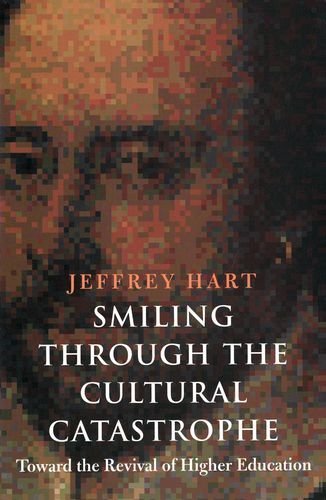Butch Leghorn
The Right Stuff
January 4, 2017
I found this book circuitously, through the Rebel Yell podcast with Musonius Rufus. Being a Southerner, a nationalist and a Southern Nationalist, I like to listen to Rebel Yell. I was excited when Musonius scored an interview with William S. Lind, a paleoconservative and one of the originators of the term 4th Generation Warfare (4GW). I recommend his 4th Generation Warfare Handbook. Lind blogs at TraditionalRight.com: “an online journal dedicated to the survival of Western civilization.”
During the interview, Lind recommends Victoria: A Novel of Fourth Generation War written by the pseudonymous Thomas Hobbes. The novel is widely believed to be written by Lind himself. In the novel, the fictional hero is recommended a series of books by a wise man, one of which is Smiling Through the Cultural Catastrophe by Jeffrey Hart, which I purchased in hardcover for 1/4 the cost of the outrageously priced Kindle edition. Hart is a Professor Emritus of English from Dartmouth. He supported John Kerry in 2004 and Barak Obama in 2008.
Published in 2001, the subtitle of Hart’s book is Toward the Revival of Higher Education. Because Lind is a paleocon and civic nationalist and critic of Cultural Marxism, and his site is dedicated to the survival of Western civilization, I expected the book to contain a critique of modern Cultural Marxism in higher education. In essence, the book’s final chapter is a rather milquetoast critique of the decline of Western civilization in academia. The book doesn’t even use the term Cultural Marxism or even the Left. What it is not: a strong critique of the Left. What it is: survey of Western literature viewed from a left-of-center academic. In it, Hart defines a citizen as one who can re-create Western civilization, if necessary. His thesis is that without a thorough knowledge of Western literature (and history), then one cannot re-create Western civilization.
The preface tells the story of a professor of philosophy who influenced Hart. The professor was a veteran of WWI, a soldier in the German army who fought at Verdun. This professor explained to Hart “that history is to a civilization what personal memory is to an individual: an essential part of identity and a source of meaning.” He also conveyed that the goal of education is to create citizens : vessels of a civilization who can re-build it if necessary. I see this as the meaning of Richard Spencer’s zen-like koan : “Become who we are”. We must be the re-creators of Western civilization, and if we are to become who we are again, then we must search our collective civilizational memory of ourselves: our history and literature. Hart’s book is a tour through what he thinks are just some of the essential memories of our civilization.
All memories of the West begin with Homer. The Iliad is the Bible of Western civilization. It’s importance to Greek thought and philosophy cannot be overstated. If you believe in White identity or European identity, then you must understand clearly that the fundamental bedrock of that identity begins with Achilles in the Iliad. Heroism and Sovereignty is the bedrock of white identity. I can’t explain in a book review why it is that War is the father of Science, but take my word for it. The Science of Greece was born out of Martial Epistemology: those who would engage in war and win have the greatest incentive understand and communicate the nature of reality (science). Sovereignty (self-rule) is founded on martial prowess (war) and war demands the creation of a confederation of warriors (aristocracy)(reciprocal insurance) who communicate truthfully about the nature of reality (science)(truthful testimony) and who’s word (oaths)(trust) must be kept with their own lives (contract)(law). The nature of Sovereignty is such that all of the values of Western civilization (science, law, trust) derive from the demands of the choice to be Sovereign. Heroic acts are those by which a man may purchase a share in the Brotherhood of Sovereigns (aristocracy). I understand that this paragraph is packed with information that may seem bewildering. I testify to you that this is the truth of Western civilization as I understand it.
Throughout the book, Hart returns to a theme of a dialectic in Western civilization between Athens and Jerusalem. Athens is Greek and represents the Western tradition of sovereignty, heroism, war, science, truth, trust, contract and law. Jerusalem is Jewish and represents mysticism and submission, intuition and magic. I’ll tell you something that Hart does not understand: Athens is male nature and Jerusalem is female nature. If you watch my video Left vs Right: Root Conflict, it will give you some explanation of this insight. This is the dialectic that Hart struggles to understand, but that he can only enunciate through literary terms, but he correctly identifies as a fundamental yin-yang of Western civilization. Men are interested in hard science and war. Women are solipsistic and control men through their words: rally, shame and ostracize. The Law is male, and the Church is female.
Hart expands on this literary dialectic in Western civilization with comparisons of Achilles (heroic sovereign) and Moses (conquering mystic), then Socrates and Jesus. Finally he reaches what he calls a “synthesis” in Saul of Tarsus, who spoke Greek and worked for the Romans and then had a dramatic conversion on the road to Damascus to become Paul the Apostle, arguably the most important apostle in terms of proselytism. Personally, I do not see this as a synthesis, I see it as the conquest of monotheism over science, as the conquest of Semitic thought over Western thought, of the conquest of the female imperative over the male. Hart is a Christian and sees the feminization of the West through Semitic thought as a moderating and positive development. I see monotheism as a technology adopted by Western elites as a cheaper alternative to Law, which requires expensive violence to enforce. Do not see this as a blanket condemnation of ‘religion’ from me: I see religious institutions as essential vessels for the norms and traditions of a society. However, monotheism conflates mythology/tradition with law. It is Western to deconflate religion and law: separation of Church and State. Obviously, we cannot rationally discover law if instead of investigating nature, we take the word of mystical prophets as the source of our law. We must have our mythologies, or positive vision of what it means to be who we are, and we must also discover our law from the reality of the nature of the world and our biology. This “synthesis” is nothing more than a conflation of Law and Mythology into monotheism, one which must now be carefully separated/deconflated.
After the first few chapters on the Dialectic of the West, Hart gives us a tour through works that he finds important and which I tend to see as a bit too celebretory of the feminization of the West. We do see in these works the Western and male impulses attempting to reassert themselves, while being under the oppressive weight of the mystic feminine monotheism. I do find this an important theme for identitiarians to understand as we become who we are: We seek sovereignty and all that it entails, and our central struggle is with our own females, to protect, provide for, and husband them while not allowing ourselves to be ruled by them through their ability to weave mystic narrative. Sovereignty and Western Civilization means Patriarchy, Science and Law.
The Renaissance, Protestant Reformation, and the Enlightenment were a series of attempts of the Western mind to break free of the weight of Semitic mysticism (deconflate Myth and Law), impelled by the progress of the printing press (network effect of human consciousness). The 20th century was a regressive century of mysticism as the Western consciousness was subverted through the centralized control of mass media. The 21st century is a neo-Rennaissance as the Western mind once again breaks free of Semitic mysticism through another technological innovation which facilitates the network effect of the Western mind: the Internet.
I see the rest of the literature that Hart presents as emblematic of the continual struggle between masculine science and the feminine mysticism in Western civilization. I found the final work discussed, the Great Gatsby, to be an example of Western man subverted from the creation of civilization (masculine) to the cause of conspicuous consumption (feminine). If anything, the Great Gatsby is a cautionary tale, a counter-narrative, and Gatsby is a figure to be pitied, as he is a lost soul, a Western man who cannot help us to become who we are, because he is enslaved to goddess worship.
I agree and appreciate Hart and Lind bringing to our attention that we can only become who we are by knowing who we were. I am thankful for the knowledge that the Iliad is the founding mythology of European identity, with its centralizing of war, heroism and sovereignty as the fundamental narratives of the West. I also concur with Hart that our history is the struggle of a central dialectic, though Hart does not see it as I do: as the struggle of the masculine to prevent subversion of his sovereignty by the feminine method mystical oratory. I now understand clearly that our literature acts as a civilizational memory, though I now read it in terms of the development of sovereignty and heroism, contract and law. At a minimum, I hope that I have impressed upon the reader the importance of a deep knowledge of our civilizational memory (history and literature) to the project of becoming who we are.
 Daily Stormer The Most Censored Publication in History
Daily Stormer The Most Censored Publication in History



